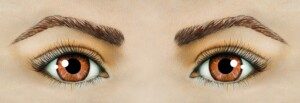I’m a clinically diagnosed Autistic but don’t have several very common, well-publicized autistic traits.
This doesn’t mean I’m less autistic than those who have them.
Autism, the Spectrum it is, means that if you’ve met one autistic individual … you’ve met just one autistic individual.
We are not all alike. For example, I find hand flapping to be uncomfortable and unnatural to do except when I’m wringing my hands to dry them or work out the burn after bouldering at the climbing gym.
The common autism traits that I do not have are not requirements for an ASD diagnosis.
They are not in the criteria as described in the DSM-5, which is the mental health professional’s manual for disorders.
However, these features are pretty common in autistic people of all ages.
8 Autism Traits that I Do Not Have
#1 Poor Eye Contact

Nobody knows what percentage of autistic people find eye contact very uncomfortable, especially since some force it and bear the discomfort.
But not every Autistic finds eye contact grueling, disruptive to focus or even mildly unpleasant.
I’ll give you good eye contact when you’re speaking to me. If I’m steamed at you you’ll get hard angry eye contact.
I also rely on eye contact to establish my authority in a tense situation with another person.
Gaze aversion is not a requirement for an ASD diagnosis.
#2 Meltdowns

Shutterstock/Frank11
The only meltdown I remember is at preschool age in response to the sound of a wood chipper down the street.
I’m not sure this was a true autistic meltdown because all I did was scream/cry and bang on the door to be let into the house.
A few years later I cried and cried during a fireworks show, but again, I’m not sure this was a meltdown.
Beyond that, no meltdowns or physical acting-out. Meltdowns are not a requirement for an ASD diagnosis.
I’m prone to very brief “hissy-fits,” though, when things don’t go the way they’re supposed to.
There are also times when my response will be Vulcan-like. I do, however, have meltdowns lasting seconds inside my head where I trash the room I’m in.
#3 Shutdowns

Shutdowns, too, are not required for an autism diagnosis, and consist of literally shutting down in the face of sensory overwhelm or stress.
The Autistic can’t speak and often becomes non-functional for hours to days, needing that long to recharge.
#4 Burnout

Freepik.com Racool_studio
I don’t mean a job or career burnout, which many neurotypicals experience, but more of a life burnout.
The autistic burnout can really incapacitate someone and can take months to recover from.
The burnout results from burning out from heavily masking.
Masking is that of trying to act neurotypical. This is more than just wearing a fake smile and making sure one’s voice doesn’t sound monotone.
Masking can involve continuous monitoring of one’s body language, facial expressions, vocal nuances, gait, suppression of stims: essentially, faking a persona to pass as neurotypical.
This make-believe persona can be the result of extensive practicing in a mirror and studying the behaviors of NTs.
No matter how convincing the Autistic is as an NT, the persona never feels natural and eventually wears them down like a 200 pound “NT suit.”
Though questions about burnouts and masking come up on autism tests, these experiences are not part of the diagnostic criteria.
#5 Executive Function Impairment

Freepik.com
This seems to be common in autism, but it may have more to do with the ADHD that commonly occurs in autistic people than something intrinsic about the autistic wiring of their brains.
My assessment ruled out ADHD. I have excellent executive function (as proven by management of life experiences and situations), though my report said it was “normal.”
#6 Difficulty in Crowds

Look, I hate crowds: a mass of slowly-moving human sludge. But hating crowds doesn’t mean that I become hysterical, non-functioning or overwhelmed by them.
I weave in and out of crowds to keep ahead of the sludge. I’m very adept at this and can pull it off without bumping into people.
It’s amazing how far ahead from the starting point I can get with this approach.
I simply do not have the patience to meld into the sludge, and have never been able to understand why people feel a need to move so damn slowly just because there’s a lot of them.
#7 Clumsiness
I’ve always been really good in gym class, beginning in grade school. I could naturally catch a ball coming my way. I could naturally, without any lessons, walk on my hands.
I was always one of the last remaining players in gym class dodge ball. In kickball I was always able to knock that rubber maroon ball way out there.
I loved how when it was my turn to kick, the kids in the field would say to each other. “Move back!” or “Uh oh!” and step backwards in anticipation of a soaring ball.
I learned to ride a bicycle I think at age eight after only the first day of practicing. I taught myself how to swim in grade school.
Klutziness is not necessary for an autism diagnosis.
#8 Social Anxiety

A dislike for socializing is not the same as social anxiety. Also, a person can have social anxiety and be neurotypical.
Though many autistic people have social anxiety, there are “extroverted Autistics” who like to mingle.
I don’t like to socialize because I’m not into people. I’ve never been a people person.
However, if I’m in a social situation, I’m quite capable of doing a lot of talking and can seem quite engaging.
I’m not masking, though. Rather, I just happen to have encountered people whom I’m connecting with in terms of good conversation.
I attended an outdoor dinner event the evening before my niece’s wedding. There were a LOT of people, standing around in many clusters and talking.
It was awkward for me, and my brother eventually reported that he had noticed that I didn’t seem to know what to do with myself. I confirmed this to him.
But I didn’t have anxiety. Instead, I was bored for much of the time and couldn’t find a cluster to integrate with. I’d go up to clusters and listen and make attempts at mingling, then leave the cluster and move on to the next.
I felt out of place, but not anxious or edgy. There were times that I was amply talking, and other times when I was quiet. I have social awkwardness, not social anxiety.
A Lot of Autistic Traits Not to Have
The above features that I’m lacking seem to be quite a bit not to have if I’m autistic.
But remember, NONE of the above traits are required for an autism diagnosis; they are not in the diagnostic criteria as outlined by the DSM-5.
Not every autistic person has every single possible autistic feature. This is why it’s called Autism Spectrum Disorder.
 Lorra Garrick has been covering medical and fitness topics for many years, having written thousands of articles for print magazines and websites, including as a ghostwriter. She’s also a former ACE-certified personal trainer. In 2022 she received a diagnosis of Level 1 Autism Spectrum Disorder.
Lorra Garrick has been covering medical and fitness topics for many years, having written thousands of articles for print magazines and websites, including as a ghostwriter. She’s also a former ACE-certified personal trainer. In 2022 she received a diagnosis of Level 1 Autism Spectrum Disorder.
.



























